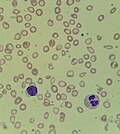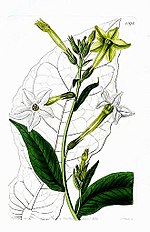Thomas Sydenham (10 September 1624 – 29 December 1689) was an English physician. He was the author of Observationes Medicae (1676) which became a standard...
28 KB (3,763 words) - 04:09, 19 August 2024
Sydenham may refer to: Sydenham, New South Wales, a suburb of Sydney Sydenham railway station, Sydney Sydenham, Victoria, a suburb of Melbourne Sydenham...
3 KB (321 words) - 11:55, 1 February 2024
Sydenham's chorea, also known as rheumatic chorea, is a disorder characterized by rapid, uncoordinated jerking movements primarily affecting the face,...
27 KB (3,014 words) - 08:43, 16 July 2024
example of European use of this procedure was described in 1686 by Thomas Sydenham, who to cure iliac passion prescribed first bleeding, followed by a...
15 KB (1,975 words) - 07:35, 1 May 2024
Laudanum (section Sydenham's laudanum)
ambergris, musk and nutmeg".: 45 In the 1660s English physician Thomas Sydenham (1624–1689) popularized a proprietary opium tincture that he also named...
50 KB (6,099 words) - 11:42, 17 August 2024
attribution to Galen is disputed, and has variously been attributed to Thomas Sydenham and Rudolf Virchow. "Dorlands Medical Dictionary:cardinal signs". "Definition:...
2 KB (193 words) - 23:25, 9 September 2022
17th-century English physician Thomas Sydenham, known as the father of English medicine or "the English Hippocrates." Sydenham developed the field of nosology...
64 KB (6,854 words) - 04:09, 11 August 2024
Sydenham (/ˈsɪdənəm/) is a district of south-east London, England, which is shared between the London boroughs of Lewisham, Bromley and Southwark. Prior...
42 KB (4,410 words) - 12:38, 31 July 2024
laudanum was recommended for pain, sleeplessness, and diarrhea by Thomas Sydenham, the renowned "father of English medicine" or "English Hippocrates"...
128 KB (15,004 words) - 10:53, 25 July 2024
William Sydenham (1615–1661) was a Cromwellian soldier; and the eldest brother of Thomas Sydenham. He fought for Parliament and defeated the Royalists...
10 KB (1,479 words) - 10:54, 21 February 2023
on gout, A Treatise of the Gout, or Joint Evil, in 1669. In 1683, Thomas Sydenham, an English physician, described its occurrence in the early hours...
83 KB (8,330 words) - 07:19, 21 August 2024
2004 in the context of traditional Chinese medicine. Another pioneer, Thomas Sydenham (1624–1689), was the first to distinguish the fevers of Londoners in...
72 KB (8,566 words) - 09:28, 21 August 2024
English physician Thomas Sydenham (1624–89). The prospectus of the Society by the time of its foundation in 1843 stated that: The Sydenham Society has been...
7 KB (516 words) - 13:30, 15 May 2024
1673 to 1675, a similar serious epidemic occurred in London, which Thomas Sydenham described as "febris comatosa". In 1695, a 20 year-old woman in Germany...
31 KB (3,225 words) - 14:03, 21 August 2024
those who employed Hippocrates's rigorous clinical techniques were Thomas Sydenham, William Heberden, Jean-Martin Charcot and William Osler. Henri Huchard...
48 KB (4,863 words) - 13:11, 12 August 2024
Thomas Sydenham theorized that hysteria was an emotional condition, instead of a physical condition. Many physicians followed Lepois and Sydenham's lead...
27 KB (3,048 words) - 23:24, 23 May 2024
palliative for the heat of the sun in field labor. In the 17th century, Thomas Sydenham valued it as an application in confluent smallpox, and William Cullen's...
60 KB (6,729 words) - 07:49, 23 August 2024
commonly used to refer to scarlet fever, "scarlatina", was written by Thomas Sydenham, an English physician. In 1827, Richard Bright was the first to recognize...
62 KB (6,693 words) - 13:27, 30 July 2024
phrase, has been traced back to an attribution to Thomas Sydenham (1624–1689) in a book by Thomas Inman (1860), Foundation for a New Theory and Practice...
7 KB (799 words) - 06:21, 11 April 2024
16th and 17th century by medical professionals such as Ambroise Pare, Thomas Sydenham, and Abraham Zacuto, who published their findings furthering medical...
38 KB (4,606 words) - 07:32, 21 August 2024
loss of function, is believed to have been added later by Galen, Thomas Sydenham or Rudolf Virchow. Examples of loss of function include pain that inhibits...
96 KB (9,537 words) - 05:17, 20 August 2024
disease of maids occasioned by celibacy." In 1681, English physician Thomas Sydenham classified chlorosis as a hysterical disease affecting not only adolescent...
14 KB (1,758 words) - 09:03, 8 July 2023
the disorder, with Thomas Willis discovering that the brain and central nervous system were the cause of the symptoms. Thomas Sydenham argued that the symptoms...
42 KB (4,875 words) - 11:58, 18 August 2024
her: therefore, she was still a virgin. Among scientific physicians, Thomas Sydenham (17th century) prescribed shunamitism for his patients. The Dutch Herman...
8 KB (1,320 words) - 23:51, 28 March 2024
phrase, has been traced back to an attribution to Thomas Sydenham (1624–1689) in a book by Thomas Inman (1860), Foundation for a New Theory and Practice...
8 KB (996 words) - 19:36, 23 June 2024
of a medical syndrome was further developed in the 17th century by Thomas Sydenham. Even in syndromes with no known etiology, the presence of the associated...
16 KB (1,759 words) - 21:13, 25 May 2024
London, Locke resumed his medical studies under the tutelage of Thomas Sydenham. Sydenham had a major effect on Locke's natural philosophical thinking—an...
80 KB (9,167 words) - 10:45, 23 August 2024
the root of the term 'carotid'. Thomas Sydenham (1624–89) mentioned the term 'coma' in several cases of fever (Sydenham, 1685). General symptoms of a person...
51 KB (5,612 words) - 11:37, 18 August 2024
Thomas Willis, widely regarded as the father of neurology, recognized hysteria in women and hypochondria in males as brain disorders. Thomas Sydenham...
47 KB (5,007 words) - 19:18, 5 August 2024
Sydenham Teast Edwards (5 August 1768 – 8 February 1819) was a natural history illustrator. He illustrated plants, birds and importantly published an illustrated...
5 KB (610 words) - 01:32, 30 May 2024




















